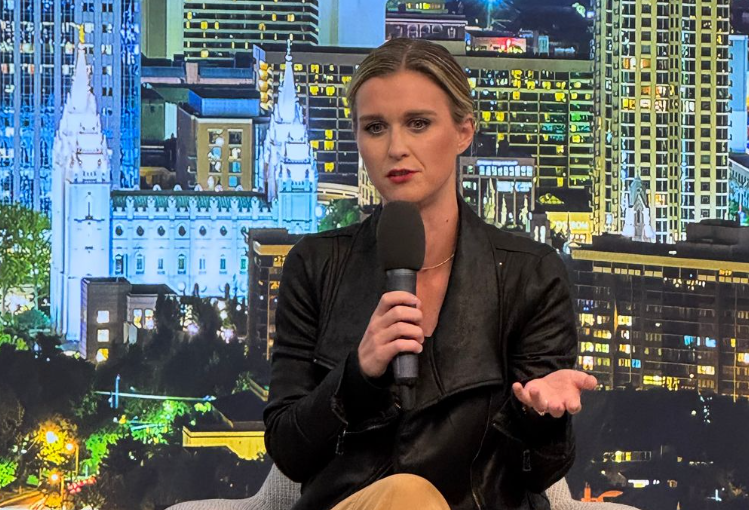

Lehi, Utah — November 12, 2025
At the Silicon Slopes Friday Conversation on November 7th, Utah Business Executive Editor Catherine Bennett joined Silicon Slopes COO Tiffany Vail to discuss the evolving role of business media in one of the nation’s fastest-growing economies.
In a state known for its steep rise in tech and entrepreneurship, Bennett has become one of the quieter but more influential voices shaping Utah’s economic narrative. Over the past six months, she has guided Utah Business through a period of transformation and continues to steer a 40-year-old publication toward greater transparency, digital depth, and broader community reach.

Bennett was candid about that evolution. She acknowledged that Utah Business has changed in recent years in how they monetize events, and is now exploring opportunities to prioritize audience growth and monetize more digital products. “The business model has morphed in the last few years,” she said. “But, it’s always been about telling your stories and celebrating what’s happening here.”
Bennett’s rise hasn’t been about waiting for opportunity — it’s been about recognizing opportunities for growth and filling them with a fresh, entrepreneurial perspective rooted in real-world experience.
The Strategic Pivot: From Marketing Leader to Executive Editor
Bennett’s journey to her current role was very much accidental. Before stepping into the newsroom, she built her career on the marketing and communication side of business — learning firsthand how brands take shape and how storytelling drives growth. While she holds a journalism degree and always valued the craft of reporting — “I liked people, and I liked to write,” she said — her early focus turned toward the commercial power of communication.
That shift deepened during a personal turning point in the mid-2010s, when motherhood collided with the limits of corporate flexibility. “I just knew it was time to pivot,” she recalled. The move led to the creation of Backpack Marketing, her own marketing agency, which grew organically through client referrals and performance rather than promotion. “When people say, ‘What are you most proud of?’ I say, ‘I put 20% down on a house,” she laughed.
Those five years of running an agency gave Bennett more than business success; they offered a founder’s perspective on risk, resilience, and resourcefulness. It’s an experience that now shapes how she approaches her editorial role. “It’s nice now that I can talk to any founder, any entrepreneur, and know, ‘Oh yeah, I feel that, I’ve felt that,’” she said. The agency still remains active, though she only interfaces occasionally with a few clients she has kept.
After Backpack Marketing, Bennett joined a manufacturing firm as an executive marketing leader, a role that pushed her into a male-dominated industry and showed her how operations and strategy intersect at scale. That perspective, she said, prepared her for the transition to Utah Business. From that vertical-agnostic experience, she gained a broader view of the Utah economy, and she is now applying the same discipline of brand clarity, process, and accountability to journalism.
The X Factor: Marketing First, PR Second
During the Silicon Slopes Friday Conversation, an attendee posed a question that resonates with many Utah founders: how can startups stand out when their teams are heads down building products, not pitching stories?
Bennett’s answer went straight to the core of earned visibility. She argued that public relations isn’t the starting line; it’s the byproduct of good marketing.
For tech founders who still believe that “if you build it, they will come,” her advice was pragmatic: focus outward before reaching for press. “You have to build it and you have to understand marketing first,” she said. “Figure out your marketing mix so that we can see you.”
It’s an approach grounded in empathy for builders. Bennett sees coverage as connection, a conversation between a company and its community. Having been on both sides of that exchange, she now brings her marketing discipline into editorial storytelling, with a focus on founders who are prepared, strategic, and authentic about their growth. Sometimes she waits for companies to mature, but when a team brings truly innovative or disruptive ideas, she does not hesitate to share their story.
Collaboration and Vulnerability
Bennett’s leadership is grounded in a commitment to vulnerability — a quality she credits as central to her own growth. Having faced personal insecurity and imposter syndrome, she believes openness is key to connection and effective problem-solving. “The quicker we can get to the vulnerability part and the openness, we can solve problems,” she said.
That philosophy mirrors what she sees as the defining trait of Utah’s business community: collaboration. She often hears from CEOs that the state’s culture is built on an “enough sunshine for all” mentality — a genuine belief that success expands when it’s shared.
Bennett plans to amplify that spirit through her coverage, spotlighting not only the wins but also the deeper structural challenges — housing, talent, energy, and infrastructure — that demand collective solutions. By telling real, unvarnished stories of those who’ve pressed forward despite self-doubt or setbacks, she aims to ensure that Utah’s business narrative remains accessible, authentic, and reflective of the people and companies who call the Slopes home.
Learn more at utahbusiness.com.

Sumit Parashar is CEO and founder of BODEX, an AI-first software firm in Lehi, Utah. He is also a Co-Founder of Utah Quantuum. With past roles at Adobe, Lumio, and Infosys, he brings decades of enterprise tech and strategy experience. TechBuzz welcomes members of Utah's tech community to contribute articles and join the conversation about Utah's vibrant tech community and entrepreneurship culture.

